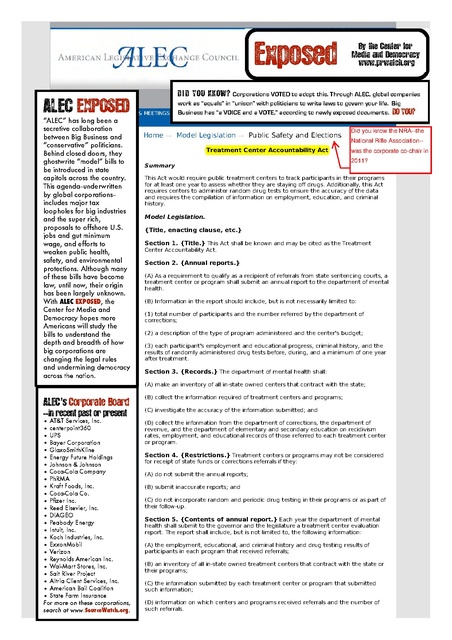Center for Media and Democracy Alec Model Legislation Treatment Center Accountability Act
Download original document:

Document text

Document text
This text is machine-read, and may contain errors. Check the original document to verify accuracy.
Exposed
D I D Y O U K N O W ? Corporations VOTED to adopt this. Through ALEC, global companies
ALEC EXPOSED
Search
ABOUT
GO
MEMBERS
EVENTS & MEETINGS
“ALEC”
NEWShas long been a
secretive collaboration
between
BigLegislation
Business and
Model
“conservative” politicians.
Civil Justice
Behind closed doors, they
ghostwrite
“model”
bills to
Commerce,
Insurance,
and Economic
be introduced
in state
Development
capitols
across the country.
This agenda--underwritten
Education
by global corporations-Energy,
includes
majorEnvironment,
tax
and Agriculture
loopholes
for big industries
and the
super rich,
Federal Relations
proposals to offshore U.S.
Health
Human
jobs and
gutand
minimum
wage,Services
and efforts to
weaken
public health,
International Relations
safety, and environmental
Public Safety
andmany
protections.
Although
Elections
of these
bills have become
law, until now, their origin
Tax and Fiscal Policy
has been largely unknown.
With ALEC
EXPOSED, the
Telecommunications
Centerand
forInformation
Media and
Technology
Democracy
hopes more
Americans will study the
Print this Page
bills to understand
the
depth andText-Only
breadth Page
of how
big corporations are
Email
this Page
changing the
legal
rules
and undermining democracy
across the nation.
By the Center for
Media and Democracy
www.prwatch.org
Home
LOGIN | LOGOUT
HOMEto
| JOIN
ALECyour
| CONTACT
work as “equals” in “unison” with politicians
to write| laws
govern
life. Big
Business
has “a VOICE TASK
and aFORCES
VOTE,” according
to newly exposed
documents. DO YOU?
MODEL LEGISLATION
ALEC INITIATIVES
PUBLICATIONS
Model Legislation
Public Safety and Elections
Treatment Center Accountability Act
Summary
Did you know the NRA--the
National Rifle Association-was the corporate co-chair in
2011?
This Act would require public treatment centers to track participants in their programs
for at least one year to assess whether they are staying off drugs. Additionally, this Act
requires centers to administer random drug tests to ensure the accuracy of the data
and requires the compilation of information on employment, education, and criminal
history.
Model Legislation.
{Title, enacting clause, etc.}
Section 1. {Title.} This Act shall be known and may be cited as the Treatment
Center Accountability Act.
Section 2. {Annual reports.}
(A) As a requirement to qualify as a recipient of referrals from state sentencing courts, a
treatment center or program shall submit an annual report to the department of mental
health.
(B) Information in the report should include, but is not necessarily limited to:
(1) total number of participants and the number referred by the department of
corrections;
(2) a description of the type of program administered and the center's budget;
(3) each participant's employment and educational progress, criminal history, and the
results of randomly administered drug tests before, during, and a minimum of one year
after treatment.
Section 3. {Records.} The department of mental health shall:
(A) make an inventory of all in-state owned centers that contract with the state;
ALEC’s’Corporate Board
--in recent past or present
• AT&T Services, Inc.
• centerpoint360
• UPS
• Bayer Corporation
• GlaxoSmithKline
• Energy Future Holdings
• Johnson & Johnson
• Coca-Cola Company
• PhRMA
• Kraft Foods, Inc.
• Coca-Cola Co.
• Pfizer Inc.
• Reed Elsevier, Inc.
• DIAGEO
• Peabody Energy
• Intuit, Inc.
• Koch Industries, Inc.
• ExxonMobil
• Verizon
• Reynolds American Inc.
• Wal-Mart Stores, Inc.
• Salt River Project
• Altria Client Services, Inc.
• American Bail Coalition
• State Farm Insurance
For more on these corporations,
search at www.SourceWatch.org.
(B) collect the information required of treatment centers and programs;
(C) investigate the accuracy of the information submitted; and
(D) collect the information from the department of corrections, the department of
revenue, and the department of elementary and secondary education on recidivism
rates, employment, and educational records of those referred to each treatment center
or program.
Section 4. {Restrictions.} Treatment centers or programs may not be considered
for receipt of state funds or corrections referrals if they:
(A) do not submit the annual reports;
(B) submit inaccurate reports; and
(C) do not incorporate random and periodic drug testing in their programs or as part of
their follow-up.
Section 5. {Contents of annual report.} Each year the department of mental
health shall submit to the governor and the legislature a treatment center evaluation
report. The report shall include, but is not limited to, the following information:
(A) the employment, educational, and criminal history and drug testing results of
participants in each program that received referrals;
(B) an inventory of all in-state owned treatment centers that contract with the state or
their programs;
(C) the information submitted by each treatment center or program that submitted
such information;
(D) information on which centers and programs received referrals and the number of
such referrals.
Section 6. {Severability clause.}
Section 7. {Repealer clause.}
Section 8. {Effective date.}
ALEC's Sourcebook of American State Legislation 1995
About Us and ALEC EXPOSED. TheAbout
Center for
Media and
Democracy
corporate spin and government
Members
Login
Logout reports
Events on
& Meetings
Model Legislation
Task Forces and
ALEC
Initiatives
Publications www.SourceWatch.org,
Home
propaganda.! We are located
in Madison, Wisconsin,
publish
www.PRWatch.org,
Join ALEC contact:
Contact editor@prwatch.org
News
and now www.ALECexposed.org. For more information
or 608-260-9713.





